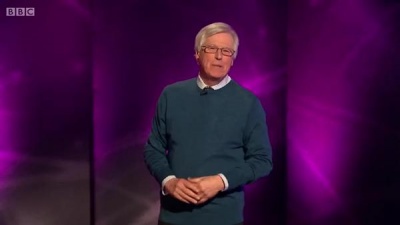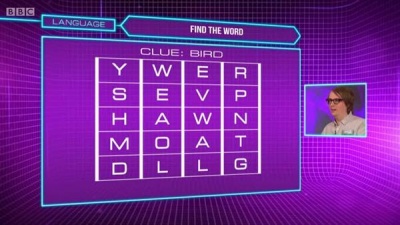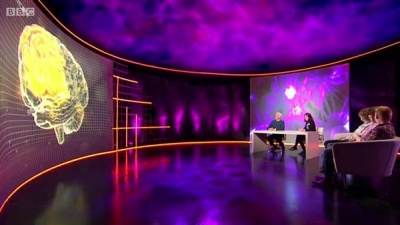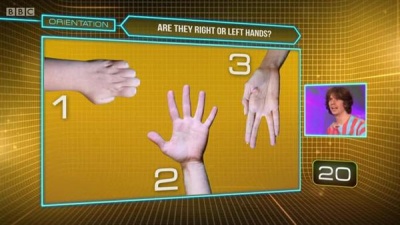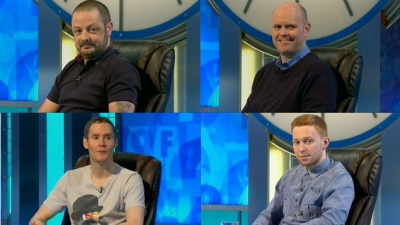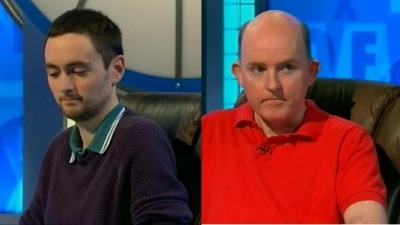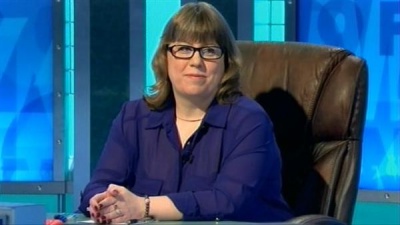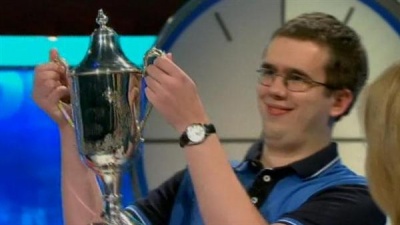Weaver's Week 2015-06-14
Last week | Weaver's Week Index | Next week
The big news this week has been about The Crystal Maze. Press releases and publicity have suggested that there's to be a live-action version of the show, to be staged at a location in London. Money for the project will be through the fashionable crowd-funding concept.
As is traditional, there are gifts to entice people to spend now, consume later. Test the games for £25, attend the red carpet opening night for £100, or hire the venue for a day – a snip at £10,000.
This column encourages caution. If all the above has set your heart racing, stop and think for a moment. You may not get value for money, and you may not get anything at all. Listen to your head.
This column has enough confidence in the people named, and thinks the risks are outweighed by the possible fun, that we've thrown some money their way. We expect to be locked in at the first possible opportunity.
Contents |
Beat the Brain
Objective Productions (an All3Media company) / Over the Top Productions for BBC2, 11 May — 19 June
A lot of people have grown up with John Craven. For this column, his Newsround was a window on the world, the warm-up to Blue Peter or Rentaghost or Grange Hill. For viewers slightly younger, he's known for Countryfile, something to watch while the Sunday roast gently cooks, and now the highlight of the nation's evening. John is a massive legend, and we could wax lyrical about him for a very long time.
So let's move on and talk about Josie Lawrence. Star of Whose Line is it Anyway, regular contributor to Just a Minute, Shakespearean talent. And, in her latest engagement, the witty and respectful Brain on Beat the Brain.
BBC2's latest teatime programme is a game show. We know that, because there's a cash prize to be won. Unlike every other daytime commission on the BBC, it's not a trivia quiz. Beat the Brain operates on a slightly different level. We're going to describe the episode from 1 June.
Six different levels, to be precise. Logic, observation, multi-tasking, orientation, language, and memory. Four of these six areas will be tested in each show. None of these areas are "who won the Battle of Stamford Bridge" or "what was the Gettysburg Address". Already, Beat the Brain is a bit different.
Teams of four gather on the BBC2 sofa (or, for some episodes, sit behind the BBC2 desk). One of the six "zones" is selected to play, and one of the team will face a pair of challenges in that zone. For instance, the Memory zone might have a challenge to repeat a coloured sequence.
The first example is always a warm-up, to demonstrate the idea to the player and the audience. Then come three scored challenges, usually getting more difficult as they go on. Rather than points, three seconds are scored for each correct answer.
And so it goes on; the Memory zone might be extended through Winning Lines, filling a noughts-and-crosses board in parts and asking the player to work out which was the winning line.
The next zone is selected, the next player steps forward to take a Language set. Spell This Word Backwards, and Spread the Word, finding the right letter in each column to spell something. This latter challenge is one of the timed games, the contender is allowed only 45 seconds to find three answers.
The quality of question is superb: it takes skill to write in so many red herrings – L-A-M but no B to complete the meat, J-A-Z but no Z for the music. Some of the questions were perhaps easier to write, and many of the ideas are familiar, but none of the questions feel unoriginal.
For the Orientation round, Hands On asks a player to identify three hands from pictures: are they left or right hands? Again, a very simple idea, but difficult to play at speed. Sat Nav follows a car turning left, right, or backwards, and asking which way it ends up.
John welcomes all the players with a firm handshake, and there's some small talk to help everyone feel at ease. Sometimes, John or the player gets to banter with The Brain. "Ooh, you look like a young Mick Jagger," she says of one contestant. "He's as bright as his t-shirt."
Over to Logic, where What's the Score is the remaining darts score after three darts have been thrown. Pick Up Sticks orders a pile of coloured sticks from top to bottom.
The set is minimal: a large video wall, a pulsating purple background behind John, and – for the final round – John holds a Beat the Brain clipboard. We approve of hosts carrying the script on a clipboard. Music for the show is by Marc Sylvan, and this does sound familiar – some of the stings might have popped up on Beat the Pack a couple of years ago. It was a shame that programme never came back, we hope for better from Beat the Brain.
Over the four rounds, the team has been gathering time in their brain bank. A great team can earn 60 seconds from the possible 72, a more average team might add 30 seconds. The time they earned is free, and if each player can answer two questions correctly in the time, they'll win £3000. After that time, the jackpot starts to drop, at £25 per second. After two further minutes, the money is exhausted and the team leaves with nothing.
Challenges in the final come from the games seen already seen, so there's no need to explain very much. The players can just take the questions, answer them as quickly as possible, and hope to win money. Most shows end with a decent climax: even with 30 seconds to go and three questions remaining, there's still hope that there might be some money won.
Beat the Brain poses a very different challenge to Eggheads, which goes out before it. We find it a refreshing change, finally there's a programme for people who aren't pub trivia masters. The eight games we've described above are about a fifth of the show's repertoire, some appear more often than others. Regular viewers won't get bored, casual viewers won't be able to predict what's on from one day to the next.
The programme is well-structured, each challenge gets a little more difficult as it goes on, and the second in a set is a bit more taxing than the first. Even if a team blobs the first few rounds, they've still got something to play for, and viewers might be able to cheer on a winning team to take £2000 or more.
Countdown
Series 72 finals
Gavin Woolnough was the champion when we last looked at Countdown in April; we'll see him shortly. Then Simon Tomlinson (2 wins), Sue Picken and Liam Thorne (1 each), Robert Baxter (2 wins), David Pooley (3 wins), and Len Hughes (1 win) all earned teapots without looking likely to make finals week. Steve Redfern became the final octochamp, with some very low scores. James Judge began his run in this series; three wins carry forward to the Christmas finals week.
Top seed Tom Cappleman fell behind in the first round of his quarter-final, when Gavin Woolnough found "Boonies". Tom only lost two rounds in his entire octochamp run in March; Gavin scrapped to five wins in April. The upset didn't last: Gavin erred in the next letters, Tom won the numbers, and it was one-way traffic thereafter. Tom won, 98-40.
Number two seed Gerry Tynan followed into the semi-finals, defeating Steve Redfern by 93-77. Gerry had eight wins around Easter, including six centuries. Steve only had one three-figure score in his recent run. "Refrains" and "Patios" gave Gerry the lead in the first two rounds; Steve had "goonless" disqualified, and his four-large numbers pick didn't help when CECIL produced easy targets.
A Granadaland battle in the third quarter-final, as Tracey Mills (Stockport) met Jordan Barker (Oldham). Both were octochamps in the winter, Tracey made six centuries to Jordan's two. A joint error and a rock-hard numbers game meant it was 8-0 at the first break. "Miniature" from Tracey got her off the mark. Jordan's "lodginess" is an anagram of the valid word "Godliness". Awkward. Jordan gambled to stay level, but doesn't spell "balero" like that. Three nine-letter words, nothing shorter than a seven, and soluble numbers mean the maximum is 158 – the highest since the start of last year. Tracey's winning score was 99-66.
Andy Noden got a tattoo of the Countdown teapot after he became an octochamp at the start of January; Kevin Steede earned his eight in mid-February. Both had five centuries, both had some outstanding and some dodgy games. "Haunted" was an early win for Kevin, only for Andy to strike back with "Candid". And there it stayed for ages, until the third numbers round. Andy thought he had it, but didn't, and allowed Kevin to open an eight-point gap. The final numbers pick was Kevin's, his speciality four large, and he won it. Andy got the conundrum, making the score a fair reflection of the game: Kevin won, 99-94.
Semi-final 1: Tom Cappleman beat Kevin Steede, 127-52
First blood is to Tom, with his winner "Grapiest" in round two, and when Tom uses 7 cubed in a six-small numbers set, he's 25-7 ahead. Kevin offers "townee", which used to be valid but has come out of the online dictionary recently; Tom's five is the first time he's dropped a point all game. Both are one off in a four-large numbers game, which defeats Rachel. It's 45-22 as Jo Brand tells another unfunny anecdote.
Kevin is later hit by the mass noun rule, Susie disallows "nortenas"; Nortena is a type of Tex-Mex music, but apparently cannot take a plural form. With a thirty-point lead, Tom again goes six-small for a 68-37 lead at the interval. Kevin perhaps expects more than eight from "Asteroid"+P, but there's no nine in that selection. There is a little later, and Tom brings up the century and seals the win with "Atrophies". Tom has scored in every round, and only three times missed perfection. A 12-max game is rare, historically only about 1% of performances hits this mark.
Semi-final 2: Gerry Tynan lost to Tracey Mills, 89-101
A high-scoring start in this game, but there was nothing between the players. Gerry thought about an eight in one round, but decided not to play it, and it would have been a loser. Tracey blows the game open with "Royalism", the only eight in its selection; she led by 49-41 at the anecdote. In this episode, Jo Brand said something very quickly and we proved that video-on-demand does mute the sound when played at 10-speed.
"Verbatum" and "Ambivert" are both offered; the latter is neither introvert nor extrovert, the former would be fine as "Verbatim", and the I was there. Gah! Sixteen the lead, but it's slashed when Gerry makes a marvellous six-small solve – nothing larger than a 7, and he reaches the 571 target. It can be done: Tracey leads 65-59 at the interval. The first player to pull out a "Weapon" would profit, it's Tracey and she doubles her lead in a very difficult round. And that proves crucial, Tracey had the match won before the conundrum.
Final: Tom Cappleman vs Tracey Mills
As seems to be traditional, Nick and Rachel begin by reminiscing about what's happened in Dictionary Corner this series, and some of the best guests. People who tune in just for the final: here's what you're missing. And people who don't tune in for the final, here's what you missed: an early winner from Tracey, whose "Beacons" beats Tom's "Beanos". Tom responds with a six-small numbers game, which he gets perfectly. 18-15 to Tom after the opening rounds.
Tom "Predicts" he'll move further ahead in the next round; his opponent is stuck with the "Tripods", and Tom's lead is past ten already. Simple numbers mean it's 43-32 to Tom as guest Jo Brand tells us of her latest adventures in wordplay. We caught an episode of BSB's daily comedy programme Up Yer News from 1990, and Jo was as funny then as she is today. No-one caught "Misgave" in one of the letters selections, both players got the four-large selection, so it's 66-55 to Tom at the interval.
The final stanza begins with "Ruralise", as seen by both players. "Thereon", a conjunction that only Tom can see, and his lead is 18 points. Susie offers an Origin of Words on climactic events, which doesn't really fit today's narrative – it's the almost inevitable conclusion to an unstoppable process. Less "Eruption", more "Routined" – the offers from the next round. Tom celebrates by offering "Floorlick" as the conundrum solution. He's won by 107-89.
Tom's stats? Eleven wins, ten centuries, 1256 points, easily the best in this series. We'll have to wait for a Championship of Champions to see how he'll measure against the other recent legends.
This Week and Next
The World Quizzing Championships aren't televised, but many of the names will be familiar to television viewers. The champion is Olav Bjortomt, a regular contestant and latterly writer on high-calibre quiz shows. Eggheads Kevin Ashman and Pat Gibson placed second and third. Ian Bayley (undefeated at Only Connect), Didier Bruyere (Mastermind finalist in a foreign language), Dorjana Širola (undefeated on University Challenge) and Paul Sinha (reigning Fighting Talk champion) all made the top twenty. The full results.
A follow-up from last week: pop culture maven James Masterton has given his opinion on the book "Bad Show".
Five interesting things from this week's BARB television ratings.
- Britain's Got Talent soared above all opposition, averaging 10.3m viewers for its final.
- HIGNFY recorded 4.3m, Who Dares Wins 4.1m, Pointless on Monday 3.85m, and Ninja Warrior finished with 3.5m.
- And then another massive gap to Big Brother (1.35m), Catsdown (1.3m), and Eggheads (1.2m). Beat the Brain is solid on 850,000.
- 915,000 for Britain's Got More Talent on ITV2, with 745,000 seeing A League of Their Own on The Satellite Channel.
Higher culture in BBC Cardiff Singer of the World, on BBC2 Wales from Monday, BBC4 from Tuesday, and Radio 3 on Friday. Celebrity Masterchef comes to BBC1 on Thursday. ITV's big movie next Saturday is Harry Potter and the Goblet of Fire, followed on ITVD by the 48-hour epic Harry Potter Wonders Why the Trophy Has Turned into a Large Rubber Duck And What He Can Do About It.
Photo credits: Chatsworth, Objective / Over the Top, YTV.
To have Weaver's Week emailed to you on publication day, receive our exclusive TV roundup of the game shows in the week ahead, and chat to other ukgameshows.com readers, sign up to our Yahoo! Group.



